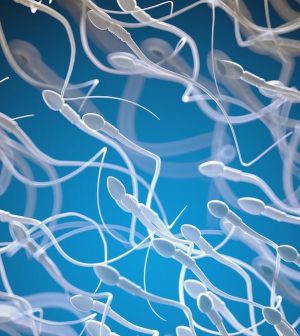- Could Your Grocery Store Meat Be Causing Recurring UTIs?
- Are You Making This Expensive Thermostat Error This Winter?
- Recognizing the Signs of Hypothyroidism
- 10 Strategies to Overcome Insomnia
- Could Artificial Sweeteners Be Aging the Brain Faster?
- Techniques for Soothing Your Nervous System
- Does the Water in Your House Smell Funny? Here’s Why
- Can a Daily Dose of Apple Cider Vinegar Actually Aid Weight Loss?
- 6 Health Beverages That Can Actually Spike Your Blood Sugar
- Treatment Options for Social Anxiety Disorder
Not Just Cancer: HPV May Hamper Men’s Fertility

Human papillomavirus (HPV) has largely been seen as a health problem of women, given that it causes nearly all cases of cervical cancer.
But men also have reason to both fear HPV and get vaccinated against it, a new study says.
Infection with high-risk HPV strains might interfere with a man’s fertility, researchers reported recently in the journal Frontiers in Cellular and Infection Microbiology.
Men infected with these high-risk strains “show increased sperm death due to oxidative stress and a weakened local immune response in the urogenital tract,” said senior researcher Dr. Virginia Rivero, a professor with the Universidad Nacional de Córdoba in Argentina.
“These results suggests that [these] men could have impaired fertility,” Rivero said.
HPV vaccines are recommended for children ages 9 to 14, as they are more effective if given before a person becomes sexually active and is potentially exposed to the virus, according to the U.S. Centers for Disease Control and Prevention.
Vaccination rates among boys have tended to lag behind those of girls. In 2022, nearly 65% of girls had been fully vaccinated against HPV compared with about 61% of boys, the CDC says.
For the study, researchers analyzed semen samples from 27 men infected with HPV and another 43 men not infected.
The HPV-infected men included 20 carrying high-risk strains associated with cervical, anal, genital, and mouth and throat cancers, researchers said. The other seven had low-risk strains of HPV.
Initial analysis found no difference in semen quality between the three groups, researchers said.
But when the research team looked more closely, they found that men infected with high-risk HPV have significantly lower counts of white blood cells called leukocytes in their semen.
There also was evidence that the sperm of men with high-risk HPV also suffer damage from oxidative stress that could break down DNA and cause cellular death, researchers said.
“Our study raises important questions about how [high-risk] HPV affects sperm DNA quality and what implications it has for reproduction and offspring health,” Rivero said in a journal news release.
“It’s important to understand the biological mechanisms underlying these effects,” Rivero added. “And, given that sexually transmitted co-infections are quite common, we plan to explore whether bearing HPV infection alongside other STIs influence these outcomes.”
More information
The U.S. Centers for Disease Control and Prevention has more about HPV vaccination.
SOURCE: Frontiers, news release, Aug. 23, 2024
Source: HealthDay
Copyright © 2026 HealthDay. All rights reserved.










